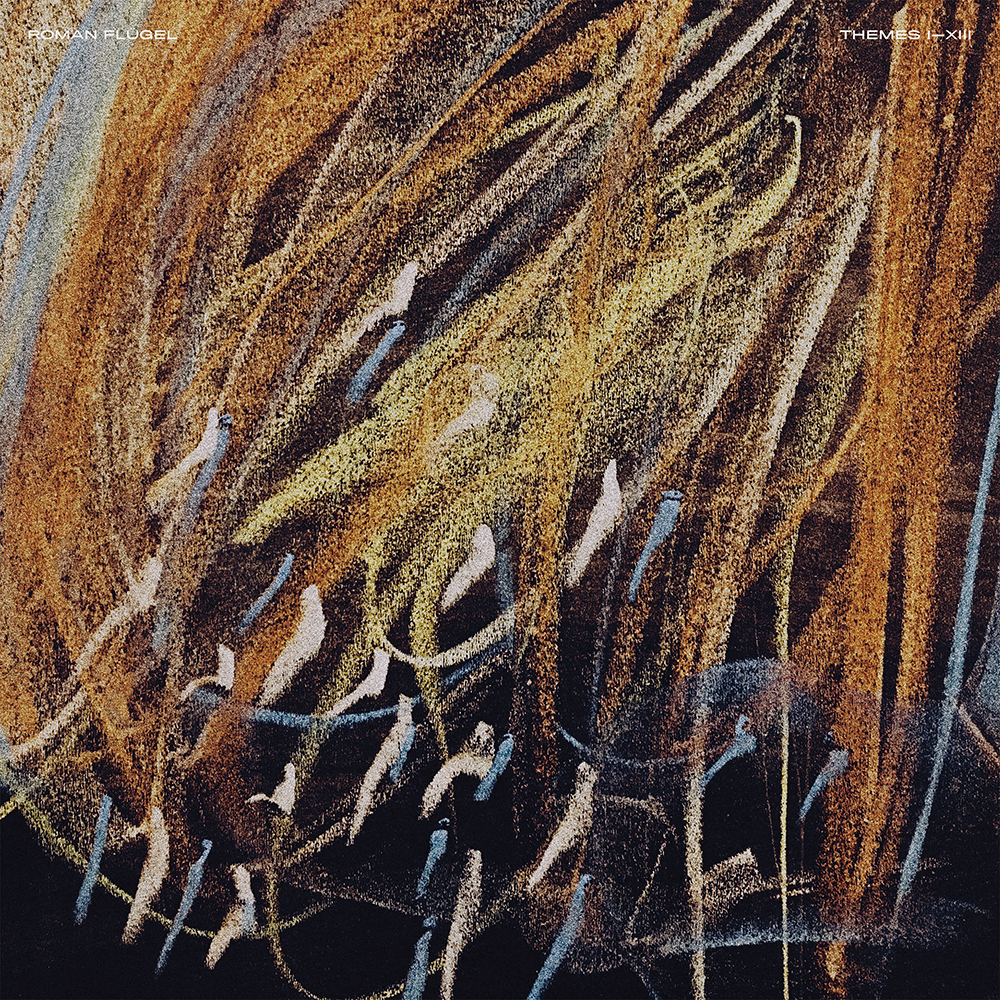Roman Flügel ‘Themes’
As interesting as ever.

Score: 7/10
Roman Flügel is not just a producer with immense pedigree, but one in good form. As well as his hat-trick of stellar LPs on Dial (a partnership that made sense on paper and even more on decent headphones), his EPs from recent years—like 2015’s Sliced Africa and last year’s Black Acid— and remix work—his 10-minute interpretation of Wolfgang Tillmans’ “Source,” for example—have kept him at the very forefront of contemporary house and techno, where he has been for the last 25 years.
But among his recent EPs, one stands out: the reissued 1995, a collection of three tracks from Flügel’s formative years, which he largely spent dishing out floor-filling acid, techno, and minimal. Whether 1995 amounts to the best Roman Flügel music ever released under his given name (as I would argue) is a different conversation, but coming so shortly before Themes, the producer’s first album on ESP Institute, the EP serves as a reminder of just how much his music has changed since the ‘90s.
While the club was always a central concern, Flügel’s early music took in endless adventurous styles. Amid the heavenly burbles of Acid Jesus (his band with long-time collaborator Jörn Elling Wuttke) and the racy breakbeatification of Eight Miles High were explorations into jazz, dub, trip-hop, and plenty of stretchy ambient. On Themes, only the latter remains. The club, meanwhile, feels like little more than a distant memory.
A gradual slowing down is to be expected of a man who will be 50 in less than two years. But with a record sleeve seemingly inspired by an autumn walk, tracks identified by Roman numerals, and a bpm that only twice exceeds 100, Themes suggests an artist who has strayed off the beat(en) track into left field, moving into a cottage and cosying down next to the fire. If his work with Dial was armchair techno, this is rocking-chair techno. If indeed it’s techno at all.
To say simply that recent Flügel music is a bit soft is not a criticism—far from it. Some of the finest moments on 2016’s All The Right Noises were beatless, Thursday Afternoon-indebted piano compositions, like sleepy opener “Fantasy” and soporific closer “Life Tends To Come And Go.” While the ambient tracks on that LP seemed to reach for the final woozy moments before sleep, Themes’ best moments step over the soft border of consciousness into a dream state. Beguiling time signatures in Themes “II” and “VIII” create the effect of a musical spirograph: a rotation of looped patterns overlapping, synchronising and gently falling away from each other with engrossing results. “VIII” is easily the album’s highlight, a mesmeric ambient piece redolent of Toshifumi Hinata and one that would still be enjoyable if it was twice as long.
A touch of Japan lingers over the whole of Themes’ dreamy second half, during which Flügel all but ditches the percussion. The eerie, spacey tones of “IX” and “X” feel like sleepwalking renditions of Kenji Kawai’s Ghost in the Shell soundtrack. The sombre guitar strings that float in and out of the album’s closing moments echo tracks like “honj” from Ryuichi Sakamoto’s recent album async. From “VIII” onwards, the stretch of ambient that concludes Themes is about as good as anything you’re likely to hear all year.
All of which makes it hard not to wish Flügel had committed to ambient for the whole thing. A little too often he wanders towards the stodgier, humdrum side of IDM, and even on one occasion into EDM territory, with the unseemly instrumental chorus of “III.” A few other tracks meander curiously without really going anywhere; “I,” “V” and “VI” are slightly too yawny, slightly too much like lift music, or a rejected soundtrack from The Sims.
Then there are two moments of murky, beat-driven dance music to remind us why we fell in love with Flügel in the first place. “IV” is ominous, forever threatening something dark and beautiful. At 110bpm it’s unlikely to impact a dancefloor like last year’s “Black Acid,” or better yet “Bibo” (from 1995), but with a remix it could have club potential. Then there’s “VII,” in truth the only club-ready cut on the album. It’s not exactly out of place—rotating key loops are once again paramount—but it’s at least a diversion. On one hand it’s welcome, one of the album’s standouts and up there with Flügel’s devastating best. On the other it betrays an artist not quite able to commit to the kind of conceptually focused album Themes might have been.
And so the question remains as to what exactly the loveable Frankfurter is trying to do with his latest effort. Themes may become known as his most conceptually experimental album, a return trip into unfamiliar territory, Flügel’s Drukqs. Or it might signal one more step away from ‘90s club hedonism toward stranger, more exploratory realms. Either way, Themes is more interesting than it is enjoyable. Nonetheless, it’s impossible not to be excited for what an artist as interesting as this might do next.
Tracklisting
01. Theme I
02. Theme II
03. Theme III
04. Theme IV
05. Theme V
06. Theme VI
07. Theme VII
08. Theme VIII
09. Theme IX
10. Theme X
11. Theme XI
12. Theme XII
13. Theme XIII
Themes LP will land on October 26.

